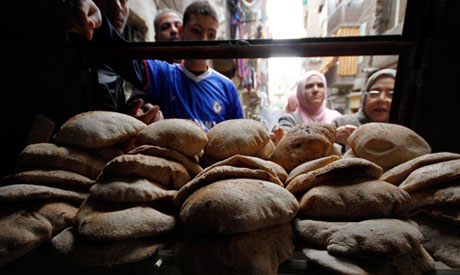Latest NEWS
- Aswat Masriya, the last word
- Roundup of Egypt's press headlines on March 15, 2017
- Roundup of Egypt's press headlines on March 14, 2017
- Former Egyptian President Hosni Mubarak to be released: lawyer
- Roundup of Egypt's press headlines on March 13, 2017
- Egypt's capital set to grow by half a million in 2017
- Egypt's wheat reserves to double with start of harvest -supply min
- Roundup of Egypt's press headlines on March 12, 2017
Egypt reconsiders wheat tender system in funding crunch-banks

Egyptians buy bread from a bakery in Cairo - Reuters
By Sarah McFarlane
LONDON, Feb 27 (Reuters) - Funding problems are forcing top world wheat buyer Egypt to consider abandoning its regular public tenders that have been a centrepiece of world grain trade for decades.
Egypt's state grains buyer General Authority for Supply Commodities, (GASC), is exploring options beyond systematic tenders to secure future needs, banks involved in commodity trade finance for the country said.
Imports to the north African country are sharply down this year, with strategic stocks falling as it endures economic and political crisis, but state and private buyers insist they have funds to keep the nation supplied with its staple bread.
Falling currency reserves are hindering GASC's ability to buy wheat in a timely manner, banks said.
GASC, which last week saw its influential head Nomani Nomani step aside, declined to comment.
"Very clearly people are looking for alternatives because the classic route of letters of credit or cash against documents are not working as they were," said Fehmi Hannachi, head of commodity finance for Middle East and North Africa at ABC International Bank plc and board member of ABC Egypt.
Karel Valken, global head of trade and commodity finance at Rabobank, said: "Letters of credit are not working to the satisfaction of all parties. It's definitely restricting the volumes and the timely arrivals of wheat and undoubtedly it's having an impact on the price. Consequently all the parties involved are looking at different ways to mitigate these issues."
Egypt normally buys strategically to ensure it has wheat stocks equal to at least six months' consumption in its silos. By contrast, the government said on Wednesday that it has stocks to last until May 29, or just three months.
GASC tenders are watched avidly by international wheat traders and without them world markets would lose a vital window of transparency.
Banks said trade houses were exploring options outside of GASC's current sourcing strategy, including private deals.
"GASC's main objective is to feed the Egyptian population in the most cost effective way and if that means for them to go out of tender terms and do a private deal they will undoubtedly do that," said Valken.
When GASC awards a tender the company selling the wheat typically asks for the issuance of an Egyptian state bank letter of credit, which is then confirmed with its own bank.
A recent development has been a requirement for GASC to post cash with Egyptian banks which serves as security for the banks confirming the letters of credit on behalf of sellers.
"This flow is still working, it's just becoming more difficult because of amongst other things the (country's situation with) FX reserves and consequently GASC's access to cash and credit with its own banks," said Valken.
"It is definitely delaying the purchases and it's more expensive. The costs for them of importing wheat have risen due to a combination of demurrage costs and financing." Demurrage charges are incurred when a ship is delayed.
FINANCING OPTIONS
The Egyptian pound has fallen more than 8 percent since the start of January, and foreign currency reserves have tumbled to $13.6 billion in January from $36 billion before the 2011 fall of former president Hosni Mubarak.
The pound's drop is putting a heavy strain on the government budget as it has pushed up the cost of state subsidies on energy and food, much of which is purchased in dollars.
ABC's Hannachi said the crisis meant other options for wheat procurement were being explored.
"A lot of operators abroad and local Egyptian importers are questioning the method because you open a tender which is pricing driven, but on the other side those providing the most competitive prices are not necessarily the most flexible suppliers in terms of financing," he said.
Importers are trying to find mechanisms with their suppliers to import the goods to Egypt, building stock locally to release progressively, to avoid the situation of having to pay for everything in one shot.
"You could supply sugar or wheat by building stock in Egypt and only release it against partial payments based on the availability of hard currency," Hannachi added.
Rabobank's Valken saw room for more structured finance in different forms to facilitate banks, grain traders and GASC.
"Trade is desperately looking at alternative structures because GASC continues to be the single largest wheat buyer globally. People definitely need wheat and the government needs to put enough foreign reserves aside to make imports possible," said Valken.
Egypt imports about half the 18.8 million tonnes of wheat it consumes a year, with business split roughly evenly between private importers and GASC. The U.S. Department of Agriculture had estimated Egypt's imports at 9.5 million tonnes in 2012/13.
GASC has bought 235,000 tonnes of wheat since Jan. 1, about a third of what it purchased in the same period a year earlier.
Regular participants in recent tenders include Archer Daniels Midland -controlled Toepfer, Bunge, Cargill, Louis Dreyfus, along with Egyptian traders Alex Grain and Venus. (Additional reporting by Shaimaa Fayed and Yasmine Saleh in Cairo; Editing By Veronica Brown and Keiron Henderson)










